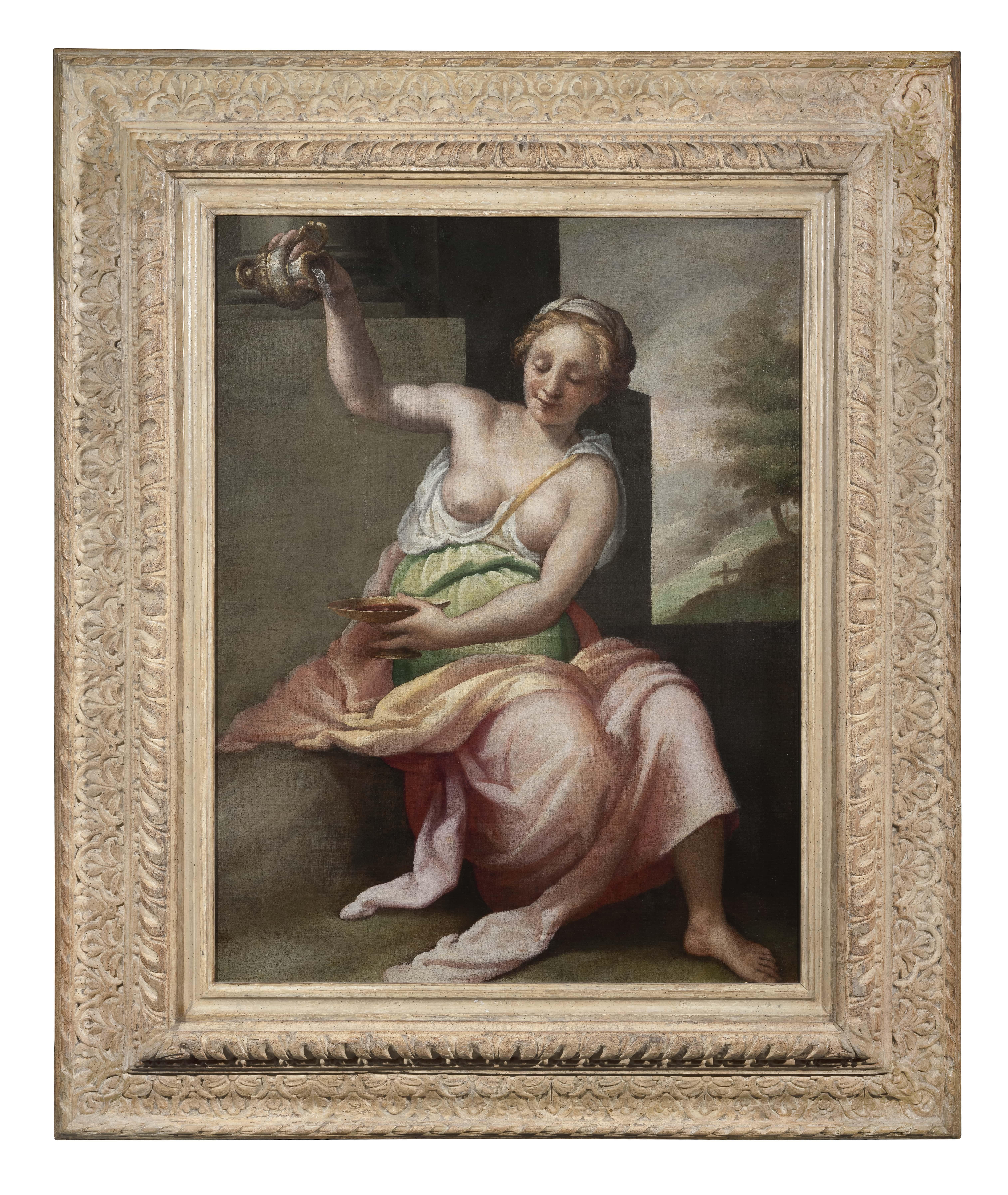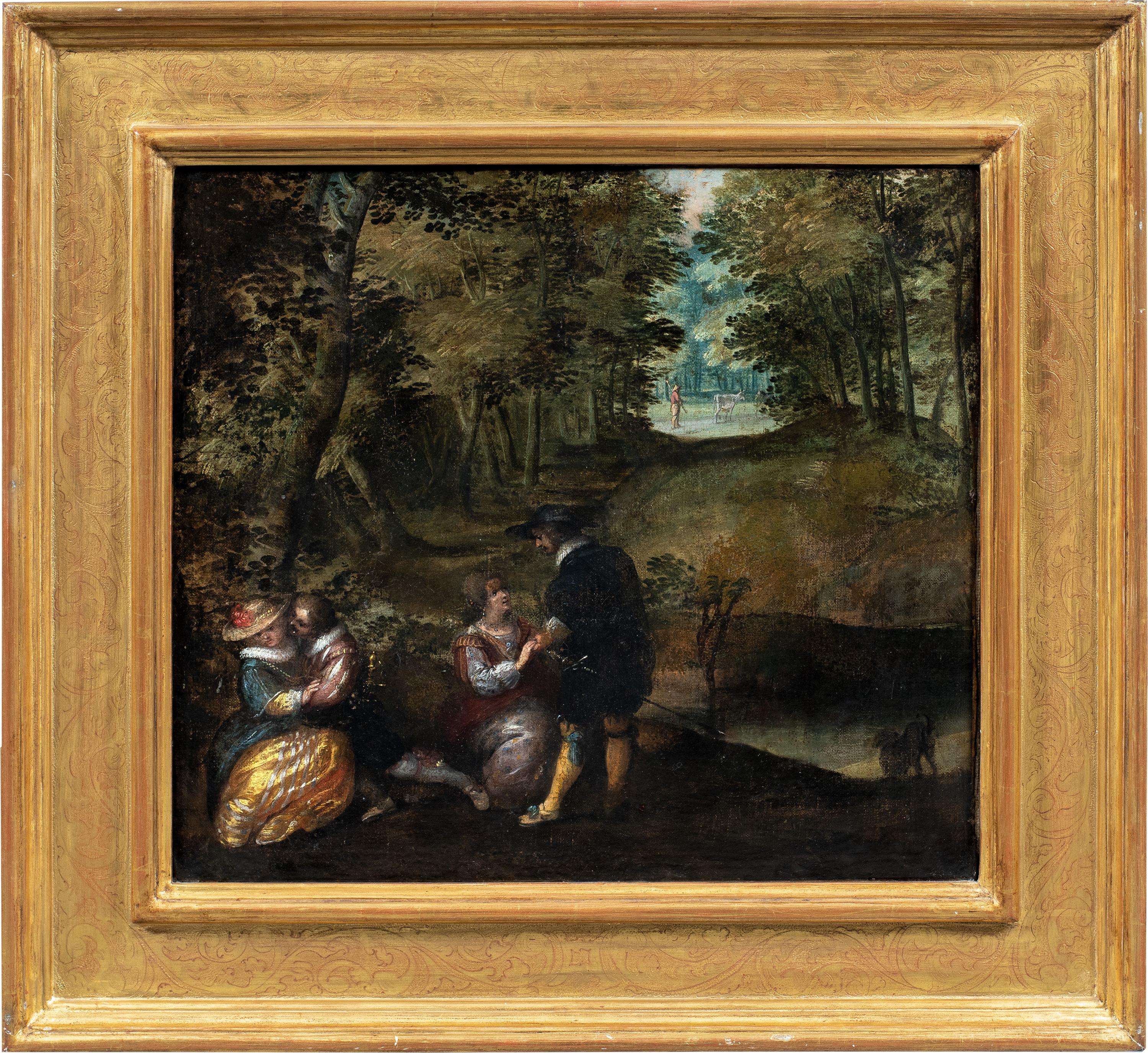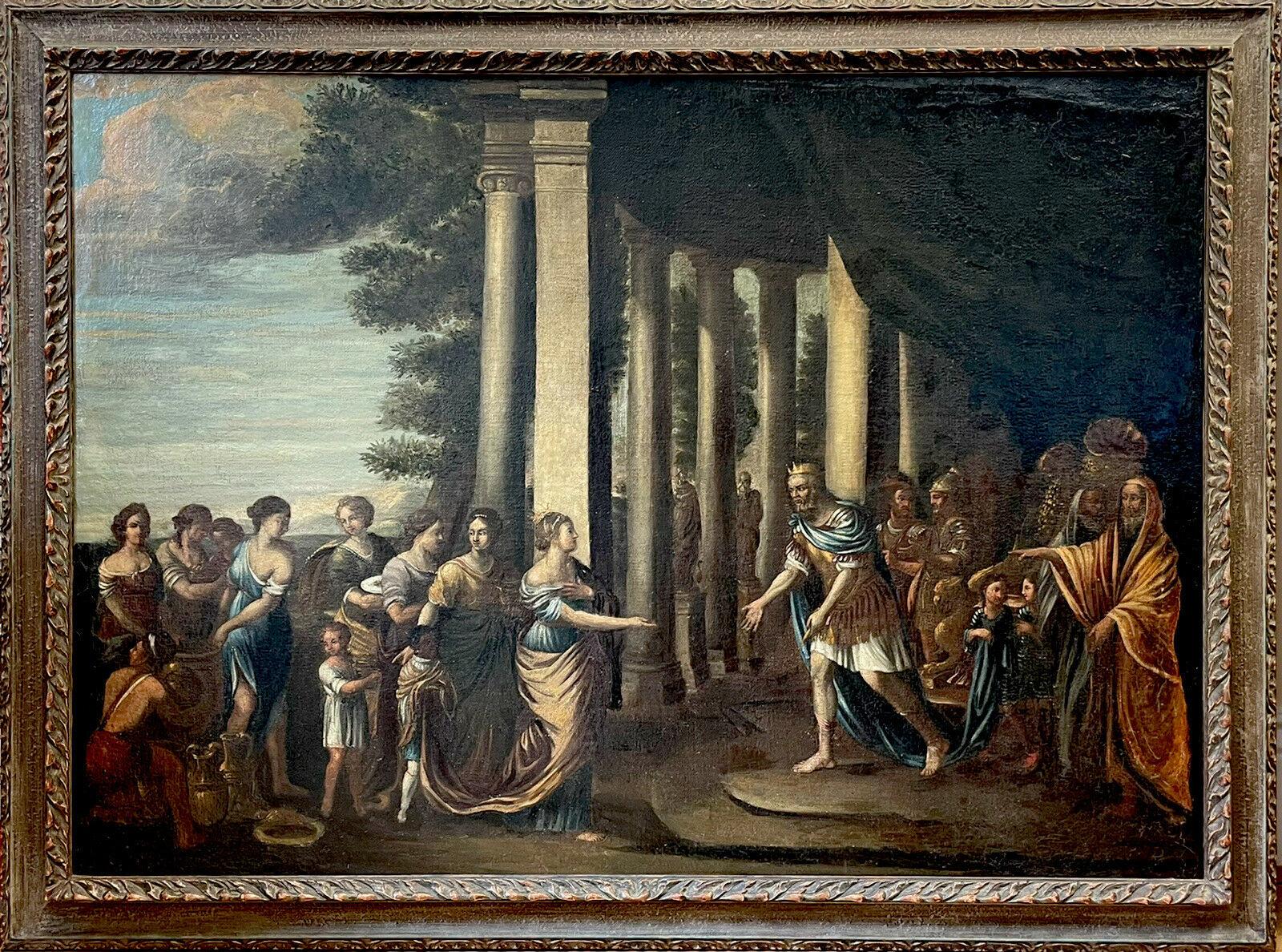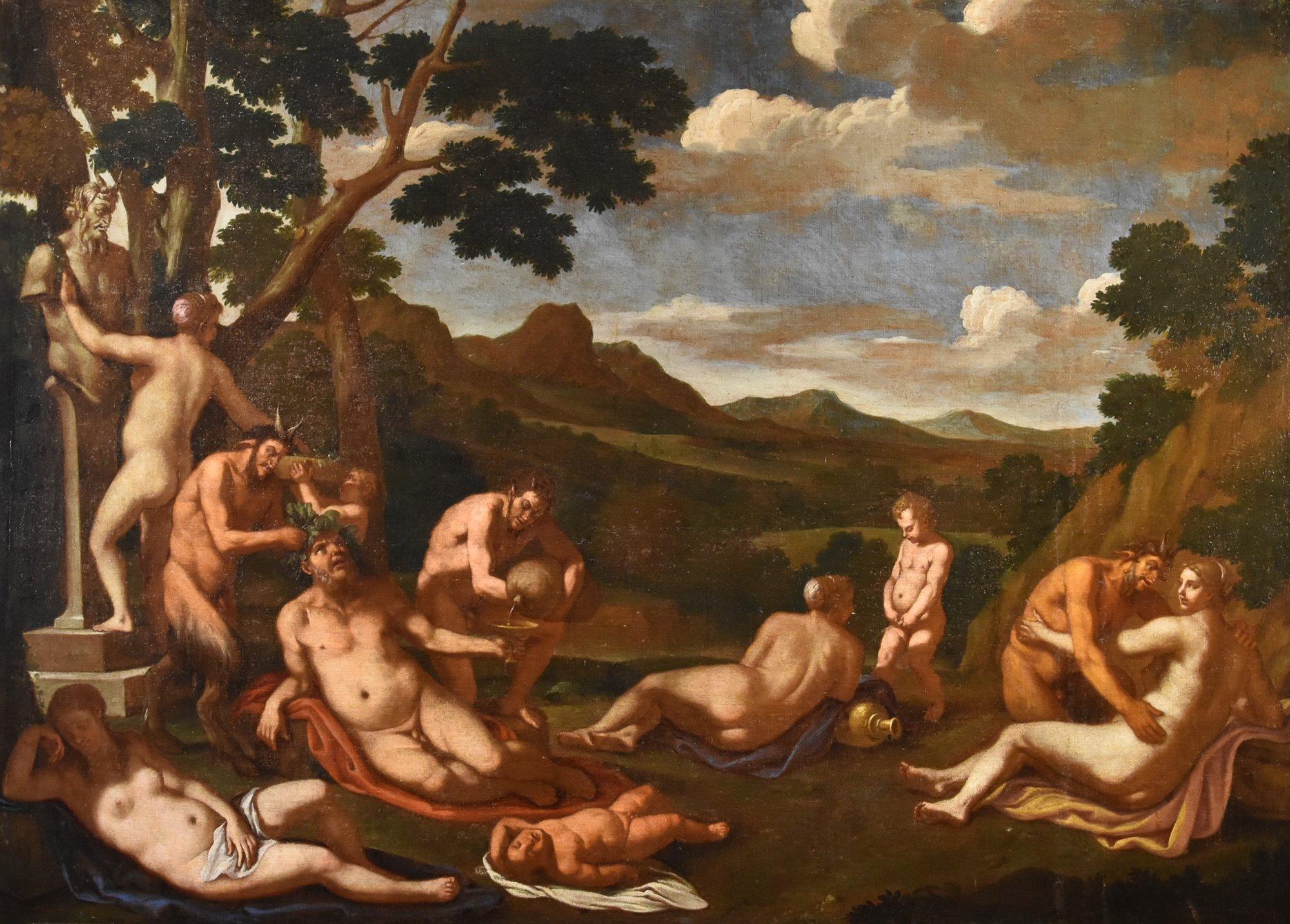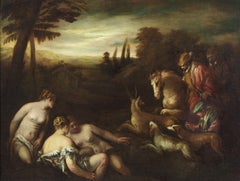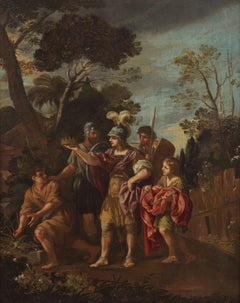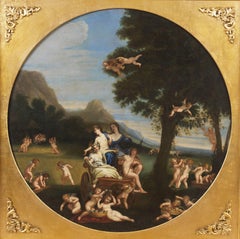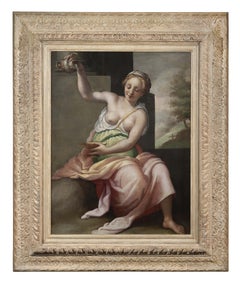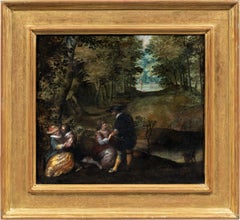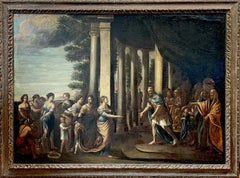Items Similar to 16th Century Parnassus Biagio Pupini called Biagio delle Lame Muses Oil on Panel
Want more images or videos?
Request additional images or videos from the seller
1 of 9
Biagio Pupini16th Century Parnassus Biagio Pupini called Biagio delle Lame Muses Oil on Panel
$11,839.33
£8,801.23
€9,900
CA$16,515.60
A$17,915.70
CHF 9,421.07
MX$217,997.83
NOK 117,778.61
SEK 111,079.69
DKK 75,394.50
About the Item
This painting (in an excellent state of conservation and of fine executive workmanship, attests to the enormous
luck of Raphael's inventions in the years following his death: in fact it is clearly inspired by the famous fresco of Parnassusdone for Julius II in the Vatican.
The first thing that catches the eye is the not secondary role given to the landscape, which in Sanzio's painting is described in detail, but it is still a background to the scenemain: here, as if passing from a zoomed in to a wide angle, our painter dilates them distances between bystanders and indulges in the description of the fifth of nature, with a remarkable
sensitivity. We see it both in the subtle tonal changes of the bank from which the waterfall descends to give a certain depth to the representation, as in the specious and detailed workmanship with which the crackling fronds are returned, leafy leaves, brush-tip, with the pigment clearer on the tips to also return the reflections of the lumen.
In the
central group changes the pose of the god of the arts and almost all of the bystanders are invented on the second
slowly, the group on the right a presents variations in the garments but, on the whole, rather follows Parnassus faithfully, while the invention of the figures on the left is new to close symmetrically the composition.
The author of the sub judice table declines the prototype in key less grandiose and noble, lighter and more sweetened than the grandeur and majesty that expire by the protagonists of the Vatican fresco, softening the movements also due to the more subtle proportions and a certain simplification of the forms, which we find in the anatomies, in the physiognomics that recur without many variations from character to character - also the harbingers of a precise attributive proposal - in the course of the geometric-shaped cloths. Just these characters of gentle formal balance, display pleasantness, sweet eurythmy of the forms captured with a certain naturalness lead to place our table in the Bolognese area, and specifically in the art of Biagio Pupini.
From Sanzio Biagio Pupini took up the idea of the figure standing in the center and the others arranged symmetrically at the sides, in poses that respond to confer harmony and coherence to the representation. Already in this work we can grasp affinity with Parnassus. in the shoes of the somewhat geometric folds concluded by the sharp contour line, in the anatomy of the Child with the detachments of the muscles somewhat simplified, in the detailed way in which the hair is restored, as in the somatic ones (see the one in profile).
Even more handheld responses in a contemporary Nativity of the Pinacoteca Nazionale di Bologna in the soft folds where the light flows gently from the shape elongated, but above all in the features, here at the limit of congruence with those of the figurines of our table: see the Greek nose with the rounded tip, small mouth, chin a little protruding and elongated almond-shaped eyes, with a pin-pointed iris. It also occurs, again, a remarkable sensitivity in the restitution of nature, especially in the foliage rendered with the brush-tip strokes imbued with matter. Recurring physiognomies and anatomies in a table coeval see the little corniche of Jesus and the profile of Saint Catherine, with her hands somewhat simplified, the feet with well delineated phalanges and a slow pouring rendering of the reflections of the lumen on the hair.
They are characters of style, immersed in an atmosphere of golden classicism, which will leave the placed in the subsequent works to a greater formal abstraction, which is expressed in a more drawing clearer, more rigid and geometric cloths, stereotyped physiognomies, an insistent comparison of the lights that with deeper shadows and a statuary prominence of the figures, as we can see in the Sant 'Orsaia with the companions of the church of San Giacomo which is also one of the last known works by Biagio Pupini. In that year the artist was elected Massaro of the four arts in Bologna: not since 1551
plus his name in the documents, an indication of his disappearance.
From the comparisons proposed here, therefore, this Parnassus is not only to be attributed to Biagio Pupini, called Biagio dalle Lame, but is to be dated in the central phase of his career, which is then the apical point, around 1530 c.a, after the beginning of the collaboration with Girolamo da Carpi.
The paintings and works of art published here are my exclusive property and therefore are always available to be viewed, by appointment, in my exhibition sites located in Sanremo and Brescia.
This item , like all our objects, is sold accompanied by a photographic certificate FIMA of authenticity and lawful origin; this document identifies the object by adding more value to the article.
We take care and personally organize the packaging and shipping of our items with insurance all over the world.
Mr. Riccardo Moneghini
Art Historian
- Creator:Biagio Pupini (1511 - 1551)
- Dimensions:Height: 22.84 in (58 cm)Width: 28.75 in (73 cm)Depth: 1.19 in (3 cm)
- Medium:
- Movement & Style:
- Period:
- Condition:
- Gallery Location:Sanremo, IT
- Reference Number:1stDibs: LU1510211034342
About the Seller
5.0
Vetted Professional Seller
Every seller passes strict standards for authenticity and reliability
Established in 2013
1stDibs seller since 2021
6 sales on 1stDibs
- ShippingRetrieving quote...Shipping from: Sanremo, Italy
- Return Policy
Authenticity Guarantee
In the unlikely event there’s an issue with an item’s authenticity, contact us within 1 year for a full refund. DetailsMoney-Back Guarantee
If your item is not as described, is damaged in transit, or does not arrive, contact us within 7 days for a full refund. Details24-Hour Cancellation
You have a 24-hour grace period in which to reconsider your purchase, with no questions asked.Vetted Professional Sellers
Our world-class sellers must adhere to strict standards for service and quality, maintaining the integrity of our listings.Price-Match Guarantee
If you find that a seller listed the same item for a lower price elsewhere, we’ll match it.Trusted Global Delivery
Our best-in-class carrier network provides specialized shipping options worldwide, including custom delivery.More From This Seller
View All17th Century Diana and Actaeon Hernest Daret Mythological Oil on Canvas Green
Located in Sanremo, IT
Painting oil on canvas measuring 80 x 62 cm without frame and 105 x 82 cm with a contemporary frame by the painter Ernest daret, depicting the myth of Diana and Actaeon.
According t...
Category
1690s Italian School Figurative Paintings
Materials
Canvas, Oil
18th Century Biblical Scene Italian School Saint Joseph Oil on Canvas Brown Gold
Located in Sanremo, IT
Painting oil on canvas depicting a soldier handing the crown to Saint Joseph, measuring 76 x 61 cm without frame and 95 x 80 cm with frame by an Italian School of the second half of ...
Category
1760s Italian School Figurative Paintings
Materials
Canvas, Oil
18th Century Earth Allegory Felice Cignani Putti Oil on Canvas Blue Green
Located in Sanremo, IT
Painting with a diameter of 130 cm and 160 x 160 cm with a marvellous frame depicting an 'allegory of the Earth' by the painter Felice Cignani ( Bologna 1660 - 1724 ).
An oil on ca...
Category
Early 18th Century Italian School Figurative Paintings
Materials
Canvas, Oil
17th Century Allegory of Charity Carlo Cignani Madonna and Child Oil on Canvas
By Carlo Cignani
Located in Sanremo, IT
Painting, oil on canvas, with dimensions of 105 x 120 cm without frame and 125 x 140 with a beautiful carved frame depicting the 'allegory of charity and love with a woman with three...
Category
1690s Italian School Figurative Paintings
Materials
Canvas, Oil
$6,726 Sale Price
25% Off
18th Century Exterior Inn Cipper Todeschini Scene People Oil on Canvas Yellow
By Giacomo Francesco Cipper (Todeschini)
Located in Sanremo, IT
Painting Oil on canvas measuring 72 x 92 cm and 98 x 114 cm with a wonderful contemporary frame depicting an outdoor inn scene by the painter Giacomo Francesco Cipper known as Todesc...
Category
1710s Italian School Figurative Paintings
Materials
Canvas, Oil
18th Century Galanti Scenes Van Limborch Rest Hunting Oil on Canvas Green Red
Located in Sanremo, IT
Pair of oval paintings measuring 66 x 89 cm without frame and 90 x 115 cm with coeval frame depicting two gallant moments during a rest from hunting by painter Hendrik Van Limborch (...
Category
1730s Old Masters Landscape Paintings
Materials
Canvas, Oil
You May Also Like
Aeneas Dido Pseudo-caroselli Roman school 17th Century Paint Oil on canvas
Located in Riva del Garda, IT
Aeneas and Dido
Attributed to Pseudo-Caroselli (Rome, active c. 1630/1650)
Oil on canvas 148 × 93 cm. framed 162 × 107 cm.
The episode depicted in the superb canvas illustra...
Category
17th Century Old Masters Paintings
Materials
Oil
$18,034 Sale Price
20% Off
Late 16th Century by Jacopo da Empoli Temperance Oil on canvas
Located in Milano, Lombardia
Jacopo da Empoli (Florence, Italy, 1551 – 1640)
Title: Temperance
Medium: Oil on canvas
Dimensions: without frame 101.5 x 75.7 cm – with frame 140 x 115.3 x 10.50 cm
Expertise by Al...
Category
16th Century Old Masters Figurative Paintings
Materials
Canvas, Oil
$79,789 Sale Price
20% Off
Ludovico Pozzoserrato (Venetian Master) - late 16th century figure painting
Located in Varmo, IT
Lodewijk Toeput, known as Ludovico Pozzoserrato (Antwerp or Mechelen c. 1550 - Treviso 1604 or 1605) - Meeting of Ladies and Gentlemen in a Landscape.
44 x 49 cm unframed, 63 x 68 c...
Category
16th Century Mannerist Landscape Paintings
Materials
Oil, Canvas
HUGE 17thC ITALIAN OLD MASTER OIL PAINTING - KING & COURT FIGURES ROMAN BUILDING
Located in Cirencester, Gloucestershire
Artist/ School: Italian School, 17th century.
Title: A King and Queen before court figures, amidst a classical landscape with Roman columns.
Medium: oil painting on canvas, framed
...
Category
17th Century Old Masters Figurative Paintings
Materials
Canvas, Oil
Bacchanale Mythological Carpioni Paint Oil on canvas 17th Century Old master Art
Located in Riva del Garda, IT
Giulio Carpioni (Venice, 1613 - Vicenza, 1678), Attributable to
Bacchanale
Oil on canvas 98 x 132 cm. - In frame 120 x 154 cm.
This high-quality, beautifully preserved painti...
Category
17th Century Old Masters Paintings
Materials
Oil
$15,919 Sale Price
20% Off
Saint John the Baptist Paint Pasinelli 17th Century Oil on canvas Old master
Located in Riva del Garda, IT
Lorenzo Pasinelli (Bologna, 1629 - 1700)
Sermon of Saint John the Baptist Circa 1650.
Oil on canvas 115 x 154 cm With frame 136 x 174 cm
Provenance Milan, Porro 6 June 2006 ...
Category
17th Century Old Masters Paintings
Materials
Oil
$24,750 Sale Price
20% Off
More Ways To Browse
Antique Nativities
16th Century Italian Art
16th Century Painted Panels
Italian Paintings 16th Century
Vintage Pulps
Antique Flemish Frame
Bathing Art
Swimmer Painting
Framed Sketch Art
Haiti Art
Nude Italian Artist
Swim Paintings
Allegory Paintings
Master Copy
Red Haired Woman Oil Painting
Vintage Circus Painting
Cuban Artists Painting
Oil Paintings Naive
